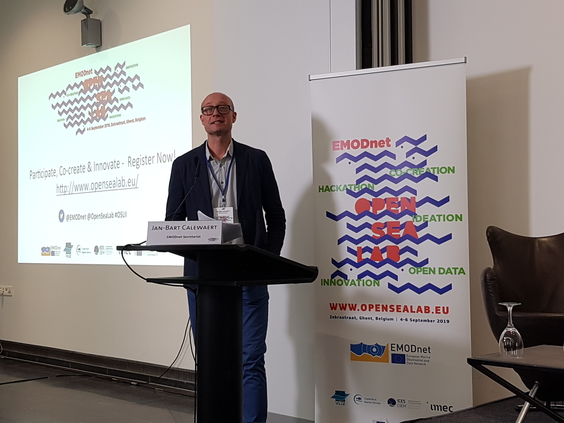Open Sea Lab II sets sail and promises more open data, more opportunities and even more excitement than OSLI!

EMODnet’s second Open Sea Lab (OSLII) was officially launched on 24th May in Brussels, at a kick-off event that marked the opening of applications for OSLII, which takes place in the vibrant and historic city of Ghent from 4 - 6 of September, 2019.
The event also revealed the challenges for OSL II and provided a taster for what is to come in September. Jan-Bart Calewaert (Head of the EMODnet Secretariat), opened the event by welcoming all those present and tuning in online. Reflecting on the success of the first Open Sea Lab, he said that OSLII would build on this and he was delighted to announce that EMODnet, VLIZ and imec, co-organisers of the first Open Sea Lab, had now been joined by ICES and Copernicus Marine.
Launching the afternoon’s programme, Iain Shepherd, European Commission, Directorate-General for Maritime Affairs and Fisheries (DG MARE), explained the relevance of OSLII to EU Policy. On November 28th 2018, the EU set out its strategic long-term vision for a zero carbon economy by 2050. Stressing that our seas and oceans would play a crucial role in reaching these targets, Iain Shepherd said that future demands on the ocean as a source of sustainable energy and food will require access to data, particularly to ensure that the growth in the ocean economy is achieved in a sustainable way. Open Sea Lab provided an opportunity to develop some applications to support the sustainable use of our marine resources.
‘Are we taking open data for granted?’ was the question posed by Conor Delaney, Environmental Data and GIS Expert, in his keynote presentation. Providing a review of the evolution of marine open data over the last ten years Dr Delaney noted that open data is democratizing science by providing everyone with equal access. We should appreciate that this is a valuable resource and expensive to produce. In the proliferation of open data we need to be able to trust the data and this is where portals such EMODnet, Copernicus Marine (CMEMS) and ICES are so important, by providing access to quality data, of known provenance and recognising the data providers. Hackathons, such as Open Sea Lab, will connect open marine data and society and we need to think how open marine data can serve society.
This is exactly the concept at the core of Open Sea Lab. How can open marine data serve societal needs? To explore this further, the next session focused on the challenge areas that applicants to OSLII would be invited to work in. To present the challenges, were three speakers, each of whom worked within one of the challenge areas.
- The ‘Marine Environmental Management and Protection’ challenge area was presented by Helen Lillis (JNCC) who noted that OSLII, was an opportunity to develop solutions to better couple our ambitions for blue growth, with those for a healthy marine environment.
- Presenting the ‘Blue Society and Ocean Literacy’ challenge area was Helene Hoffmann (Ecologic Institute), who explained that creating a more ocean literate ‘Blue Society’ where people were educated and empowered to have a voice in the governance process could contribute to more sustainable and productive oceans.
- Finally the ‘Sustainable Blue Economy’ challenge area was presented by Noémie Wouters (Greenbridge) who drew attention to the EU Blue Economy Report 2019 and said that data was central to the blue economy and access to open source data represented a real added-value for industry.
Having revealed the challenges, technical experts from EMODnet (Pascal Derycke), ICES (Neil Holdsworth) and Copernicus Marine (Fabrice Messal) demonstrated the data, products and services available via their portals and invited potential applicants to explore the diversity of resources, from data and data products on marine litter to underwater noise and from fish trawl surveys to sea ice. Further information on these resources and how they can be used can be found in the respective presentations below:
- EMODnet Data, Products and Services
- ICES Data, Products and Services
- CMEMS Data, Products and Services
A lively panel discussion on ‘Open Data’, moderated by Mathias Van Compernolle (imec), included some of the afternoon’s speakers Conor Delaney, Helen Lillis, Iain Shepherd, Neil Holdsworth. They were joined by Lennert Tyberghein (VLIZ) who stressed the importance of the FAIR data approach, to make data ‘Findable’, ‘Accessible’, ‘Interoperable’ and ‘Reusable’.
The kick-off event concluded with both a retrospective and a future look at Open Sea Lab. Laurent Dubroca, Ifremer, provided a very amusing 'Testimony of a Participant’, reminiscing on his experience as a participant at Open Sea Lab 2017. He encourages anyone thinking of applying to do so and avail of all that was on offer at Open Sea Lab II.
The launch event for EMODnet’s Second Open Sea Lab closed with a ‘Call to Action to Apply’ from Dimitri Schuurman (imec) who provided a taster of what is to come at OSLII. In a nutshell anyone with an interest can apply. No previous experience is necessary and diverse backgrounds were welcome. Expert coaches will be on hand throughout the event and there is an opportunity to pick up a new skill from one of the workshops. Maybe you already have an idea you would like to work on, or maybe you want to work on one of the challenges. Come along as an individual or a pair and you will be matched into a complete team with people with complementary experience, or bring your own team. All the options are there, just apply and get on board!
- Sorry you missed the event? View the entire webcast http://www.opensealab.eu/stream
- Interested in one of the presentations? Find them here in the kick-off programme
- For all the information of Open Sea Lab, check out the website www.opensealab.eu
- Apply now to participate in Open Sea Lab http://www.opensealab.eu/applications
